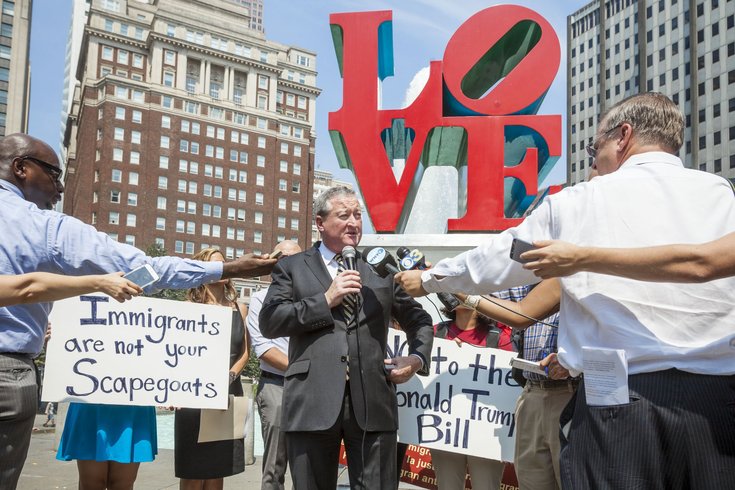
June 22, 2017
 Thom Carroll/PhillyVoice
Thom Carroll/PhillyVoice
Jim Kenney advocates for "sanctuary city" policies during a rally at LOVE Park in July 2015.
Mayor Jim Kenney's administration told the U.S. Department of Justice on Thursday that its immigration policies fall in line with federal law.
Through a letter from City Solicitor Sozi Pedro Tulante, the city "formally certified" with the U.S. Department of Justice that its sanctuary city policies, some of which date back about 15 years, are legal under the portion of the federal immigration law that prohibits local governments from enacting their own laws banning or restricting the sharing of immigration statuses of people encountered by police or other municipal agencies.
"If officers inadvertently come upon such information, the letter explains that Philadelphia policies [allow] the information to be shared if the individual in question is a criminal suspect," a Thursday press release from the city states. "As further proof that the City is in compliance with Section 1373 [of the federal immigration law], the letter also states that Philadelphia uses common law enforcement databases to which the federal government has access."
City law enforcement does not input immigration status into those databases, stressing again in the release that it does not collect such information. But actively having access to the database allows the city to share such information with federal law enforcement – if it had any.
An inquiry seeking comment from the Department of Justice was not returned Thursday.
In 2016, the Department of Justice told the Kenney Administration that in order to receive a $1.67 million Justice Assistance Grant, it had to certify its compliance with Section 1373.
The department then sent a letter to Philly and eight other sanctuary cities in April, reminding them that they had until the end of June to assert their compliance.
"In practice, Philadelphia's policies result in information-sharing with the federal government about criminal suspects or detainees in the city's custody, and in the protection of confidential information about individuals who are of no criminal concern," Tulante said in a Thursday morning press briefing.
Tulante also stressed that Mayor Jim Kenney's administration believes the certification is unnecessary and Section 1373 is irrelevant to the grants, which city officials plan to spend on a variety of public safety and criminal justice projects, including overtime and training for city police officers.
Kenney said since John Timoney's tenure as commissioner of the Philadelphia Police Department from 1998 to 2002, the city as shaped policies to allow immigrants to pursue the "American dream," while holding criminals accountable.
"I will do everything in my power to uphold those longstanding policies, not only because I believe it’s the morally right thing to do but also because I know it makes our city safer and economically stronger," Kenney said.
Officials said immigration advocates and other stakeholders have been briefed on the letter, which will be publicly released once the Department of Justice notifies the city that it has received it.
The city has received $8.7 million in JAG funding since 2012, according to a July 2016 PhillyVoice report.